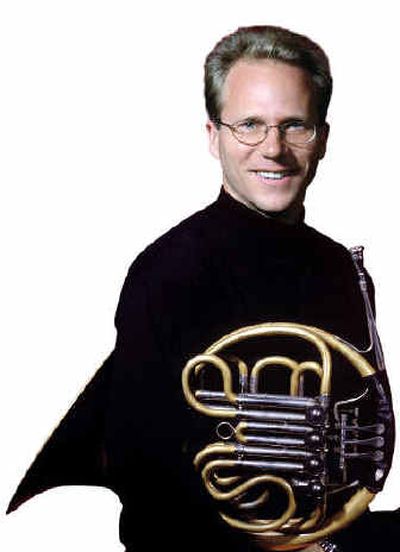Late in alphabet, first on horn

Eric Ruske wanted to play the trumpet. But because of the alphabet, he became a French horn player instead.
“Like a lot of kids, I started in the public school music program when I was in the fourth grade,” Ruske says. “And like a lot of boys, I really wanted to play the trumpet.
“But they started giving out instruments in alphabetical order, so by the time they got to Ruske, all the trumpets were gone.”
In the years since he was sent home with a French horn, Ruske has established an international reputation as one of the outstanding virtuosos on that demanding instrument.
He will perform horn concertos by Mozart and Strauss with the Spokane Symphony on Friday night. The program, conducted by music director Eckart Preu, also will include Mozart’s Symphony No. 38 (“Prague”) and Paul Hindemith’s symphony “Mathis der Maler.”
Ruske was born in LaGrange, Ill., a suburb of Chicago.
“Neither of my parents were musicians,” he says. “My father was an electrical engineer and my mother was a second-grade teacher – a great combination of right-brain and left-brain.
“My father is a wonderful man, but he was a disciplinarian, so whatever instrument I’d brought home from school that day, you can be sure he would have made me practice it.”
Ruske’s sister studied cello for a while, he says, “but in the battleground that is volume between two competing instruments, I won. I remember quite a few slammed doors at home when we were both trying to practice.
“I was pretty serious about the horn at a pretty early age,” he adds. “I don’t remember a time when I wanted to do anything else. I could never imagine not playing the horn.”
In high school Ruske studied with Eugene Chausow, and he continued his studies at Northwestern University with Dale Clevenger, principal horn of the Chicago Symphony.
“Mr. Chausow got me started on the right foot,” Ruske says. “And then when I went on with Mr. Clevenger, I had the best of all possible schooling. So I couldn’t help but turn out somewhat half decent.”
Ruske turned out to be much more than “half decent,” critics and musicians agree.
In 1985, then only 20, he was appointed associate principal horn in the Cleveland Orchestra. Subsequently he won prizes in a series of international competitions in the United States and Europe.
“I loved playing in the Cleveland Orchestra; it was a great experience for me,” Ruske says. “It’s a world-class orchestra with some really sweet people in it who helped me a lot. But I had decided that there were other things I wanted to do.
“I moved to Boston – because I wanted to live near the ocean – and began doing some teaching, and in about six months I got a job playing in the Empire Brass Quintet. I was with them for six-and-a-half years. Then I ‘retired’ again.”
Now Ruske teaches at Boston University, gives an annual horn seminar at Tanglewood, performs as a soloist and in chamber music, and makes recordings for the Albany label. He has just recorded a soon-to-be-released CD containing both concertos by Richard Strauss as well as one by Strauss’ horn-playing father, Franz Strauss, and the Horn Concerto by Reinhold Gliere.
“For me the two really great pieces of music centering around the French horn are Strauss’ Second Concerto and Britten’s Serenade for Tenor, Horn and Orchestra,” Ruske says. “Both are total pieces of orchestral chamber music, simply very great music.
“Strauss had written a horn concerto for his father at the very beginning of his career, then he came back with a second horn concerto near the very end of his life. It has the kind of musical ruminations you might expect from someone at the end of a long and fruitful life – not a sad nostalgia, but a remembrance of some of the sweet moments, looking back over his life and enjoying thinking about it.”
In Friday’s concert, Ruske will couple the Strauss concerto with Mozart’s Horn Concerto No. 1.
“Even though I have recorded all the Mozart concertos, I don’t play this one very often,” he says. “It has some wonderful tunes – it is Mozart, after all – and a really fun rondo for a finale. But it only has two movements instead of the usual three, and they are very short.
“Since it lasts less than 10 minutes, it has to be paired with something else in a concert. I think it will be a great appetizer for the Strauss.”
Ruske will join host Verne Windham – former principal horn of the Spokane Symphony, now program director for KPBX-FM public radio (91.1) – for Classical Chats, the symphony’s pre-performance conversation, today at 12:15 p.m. in the council chambers at Spokane City Hall. The 30-minute program will be televised on City Channel 5.
Preu will discuss the music on Friday’s concert as a part of the Gladys Brooks Pre-Concert Talks series in the Opera House auditorium at 7 p.m.